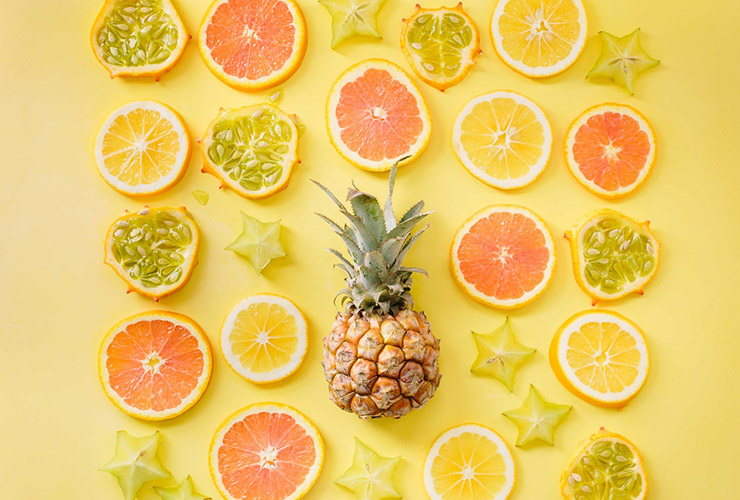
A largely plant-based diet is part of a healthy lifestyle. But what really happens to your body when you eat more fruits and vegetables (or not)?
—
Do you eat enough fruit and veggies?
We all eat these items in some form or shape, but most of us are not really aware of how much is actually necessary for a healthy and balanced diet. If you are like me, you’ve probably comforted yourself with those three little smooshed cherries in your large piece of cake, thinking you’ve satisfied your daily vitamin intake. But the harsh truth is that too many people have diets low in plant consumption.
From a nutritional standpoint, all vegetables are not created equal.
That’s why it is important not to overeat starchy vegetables, like potatoes, corn, peas and rice, as they are high in calories and associated with weight gain. Plants like spinach, flaxseed, avocado, broccoli, apples, berries, etc. are rich in fiber and water, which add to the feeling of being full because they are not packed with empty calories and unhealthful fats. The World Health Organization recommends at least 400g of fruit and vegetables per day. Given that only a small percentage of the population meets this quota, it’s not surprising that so many of us suffer health issues and chronic diseases.
What really happens to your body when you avoid your greens?
1. Your Weight FLUCTUATES
During my journey of weight loss, I used to think losing weight was simple math — you count your calories and make sure not to eat more than you burn. I managed to successfully meet my weight goals, but I developed some health problems along the way — like the Insulin Resistance, bowel problems, and depression, which eventually led to me gaining everything back.
Vegetables and fruits should be part of every meal in order to keep your metabolism working optimally.
If you’re struggling with weight, don’t look for quick and drastic solutions immediately. Try making small changes, like adding produce to your everyday meals. For example, next time you make scrambled eggs or pasta sauce, just add some extra spinach, almonds or dried tomatoes. You can also try adding a small, but rich, salad as a side dish with every meal.
2. You Experience Digestion Problems
Deficiency in fiber can cause many digestive-related problems — such as hemorrhoids, constipation, diverticulosis, and more. Vegetables and fruit are a primary source of fiber and cellulose. They also help with stool complexion and improve bowel efficiency.
The better your bowel functions, the better and faster your metabolism functions. This is the core of healthy living.
In order to meet your fiber goals, eat a lot of green veggies, such as broccoli, spinach, lettuce, cucumber, or kale. It’s easy to mix them in salads with other veggies, or as a side dish with pasta or meat. Most fruits, and especially citrus fruits (oranges, tangerines, etc.) are also high in fiber which can help with constipation and poor bowel movement. But be sure to consume the whole fruit; the juice alone is stripped of much of the fiber, leaving a high-calorie, sugar-packed liquid that can spike your metabolism.
3. You Risk Nutrient Deficiency
Your body needs essential nutrients on a daily basis such as Vitamins A, E, B12, C, D, Potassium, Calcium, Folic Acid, Iron, minerals and antioxidants. Deficiency of the same can lead to a high risk of chronic diseases and trigger symptoms like nausea, chronic headaches, fatigue, irregular heartbeat, dehydration, and even depression. To avoid this, make sure to eat a variety of plant-based foods, like beans, nuts, red berries, greens, roots, in order to maintain a stable and happy metabolism.
Imagine it as a rainbow on your plate — the more colorful, the better!
If you find it difficult to incorporate a variety of foods in your diet, a simple solution is to use green powders, like Lean Greens — a fantastic food supplement packed with all the necessary vitamins and minerals we usually fail to ingest on a daily basis solely through fresh produce. No wonder health gurus and fitness enthusiasts flash around all those smoothies and shakes — they are truly health bombs!
4. Your Overall Health Suffers
Chronic diseases and conditions like high blood pressure, diabetes (type 2), high cholesterol, strokes, and even cancer, can all be related to poor dietary habits. Nutrients like potassium, magnesium, and calcium are associated with lowering levels of sodium in the bloodstream — the common cause of high blood pressure. Type 2 diabetes is closely related to obesity and high-energy foods, including simple starches, sugars and excessive consumption of unhealthy fats.
Fortunately, regular consumption of vegetables and fruit will help you manage your weight problems, improve your gut health, improve your mental health, lower your blood pressure and cholesterol levels, stabilize your metabolism, as well as improve your cardiovascular system.
Eating right needn’t be a burden; it should even be a joy to discover new recipes and form new habits to help you feel more vibrant.
So, go ahead and do your body a favor. Take care of it now so it can serve you well in the future.
[Disclaimer: Health-based content published by Best Self Media is not intended to be interpreted as medical advice, nor to replace the recommendations or counsel of a medical professional. Rather it is our intent to present valuable perspectives from the experiences or research of our contributors.]
You may also enjoy reading Ketotarian: A Refreshing Take On The Keto Diet With a (Mostly) Plant-Based Twist by Dr. Will Cole